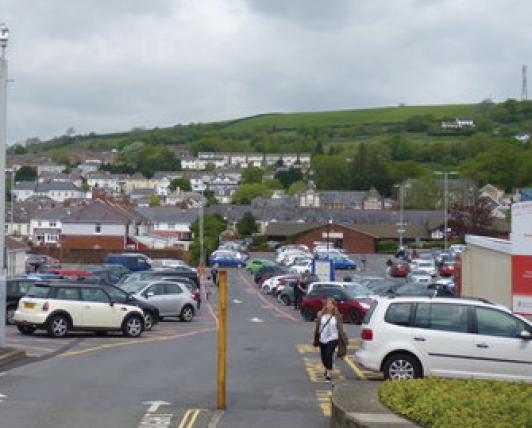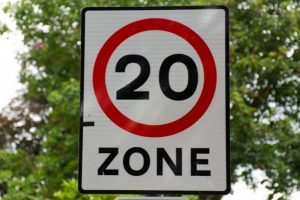
A REPORT which was intended to ‘research different approaches to car parking charges that could be applied in the county’ was discussed by the Environmental and Public Protection Scrutiny Committee on Friday (May 13).
A number of points were raised by councillors from across the political spectrum, which will now be incorporated in the re port which will go before the Executive Board.
As The Herald reported last week, the Task and Finish Group report had been criticised for not carrying out its remit, and being too dependent on reports given to the committee by council officers. One commentator on social media pointed out similarities in tone between the report discussed on Friday and one produced by council officers last year.
COUNCILLOR QUESTIONS
Two county councillors with wards in Carmarthen attended the meeting to ask questions about the report, one of whom, Cllr Alun Lenny, had raised questions about the scope of the report’s research and the extent to which it had fulfilled its remit before this meeting.
Chair of the Task and Finish Group and the Scrutiny Committee, Cllr Peter Cooper, started by introducing the report. Cllr Cooper acknowledged that parking charges were ‘a very emotive topic,’ and that this Task and Finish Group had provided group members with the opportunity to study the evidence on car parking charges.
“During the review it was clear that the rationale and policies for charging are complex and that contrary to common perception, no parking is completely ‘free,” Cllr Cooper added. “It was therefore important for us as a Group to satisfy ourselves that there was a clear and fair rationale to the Council’s parking policy and pricing strategy.”
This was questioned by Cllr Lenny and Cllr Jeff Thomas, both of whom queried the consistency of car parking charges, within Carmarthen town, and in comparison with Carmarthen and the rest of the county.
It was pointed out that Sunday parking provision near churches varied widely in differing locations in the town, with one car park which served three churches offering free parking, while another which served five did not.
Cllr Thomas also queried the competitiveness of car park pricing in Carmarthen which, he said, was more expensive than Bridgend for one hour, and the most expensive of the 15 towns referred to in the report for between one and three hours parking.
In response, Cllr Cooper said that the report focussed on the whole county. “You are looking at Carmarthen alone,” he added.
Head of Transport Steve Pilliner responded by stating that free parking spaces had been allocated when Sunday charging was introduced following consultation with church leaders, and that the evidence put before the committee regarding pricing took into account each town’s needs, pressures on highways, and revenue put back into infrastructure.
OFFICER LED?
While also mentioning the apparent disparity between parking charges in Carmarthen and the rest of the county, Cllr Lenny’s questions centred around the nature and scope of the research carried out by the Task and Finish Group, and the amount to which it was dependent on data provided by council officers.
He also queried why church Ministers, local members, and chambers of trade had not been given the chance to talk to the group directly.
Cllr Cooper said that without help from officers any Task and Finish Group ‘would not go anywhere.’
“You have to go with officer information,” he added.
However, Cllr Cooper strongly denied that the report had been ‘officer-led’, stating that the Group had not taken all the officer recommendations.
In relation to consulting with ministers and Chambers of Trade, Cllr Cooper pointed out that there were too many churches in the county to make individual consultations viable.
In response, Cllr Lenny remarked that Cllr Cooper had said that on the one hand the report was not officerled, but on the other that it had depended on officer reports.
“My point is, the group should have consulted other bodies,” he added. “If the Task and Finish Group recommendations are based on little more than recommendations from officers, would the committee consider rejecting them?”
Mr Pilliner pointed out that the group had been tasked with providing a specific consultation which took into account the council’s budget.
According to Carmarthenshire County Council, Task and Finish Groups are designed to:
- “Assist the Executive Board in the development, monitoring and review of policy.
- Scrutinise, as a key element of the consultation process, the proposed revenue budget strategy and capital investment programmes.
- Enable the participation of external organisations and partners in consideration of issues that may impact upon the delivery of Council and countywide priorities.”
FOOTFALL
Carmarthen West County Councillor Alan Speake said that he understood the concerns of other local members, and suggested that there had not been sufficient consultation with local members.
Cllr Speake also suggested that the report was lacking in ‘local information’, and concentrated too closely on UK-wide reports. He also raised concerns about a recent drop in footfall in Carmarthen, asking whether the ‘novelty was wearing off’ concerning the Catherine’s Walk development, for locals and tourists alike.
Mr Pilliner explained that the facts presented in the report showed an increase in parking ticket sales year on year, and that there was ‘factual evidence’ of an increase in footfall in town centres.
One of the reasons he gave for the variation in parking costs was the increased need for subsidies for public transport in the west of the county – including the Park and Ride in Carmarthen. He reiterated that all the evidence the Task and Finish Group had asked for had been presented to them.
Labour Councillor for Pontamman Colin Evans remarked that it was unfortunate that the Scrutiny Committee had to operate within the ‘limited’ remit of only being able to recommend and endorse the report. “It becomes hugely important that when local members are asked to comment that these comments are passed on,” he added.
Cllr Evans also questioned whether footfall necessarily equated to increased prosperity for town centres. Cllr Bill Thomas (Lliedi) agreed. “Footfall has increased by 37,000 but that doesn’t equate to prosperity – we have to look at when and why people come into towns,” he added.
“We need to make recommendations or re-look at the points being made.”
Mr Pilliner pointed out that some degree of parking enforcement was necessary, citing the example of Aberystwyth in 2011, when a mixup left the town without any parking enforcement for some months. “It descended into chaos – traders were asking for enforcement to be introduced,” he added.
ALTERNATIVES
Some alternative parking schemes were considered in the report, including a recommendation that ‘where feasible, the Council introduces ‘shop and drop’ bays in the county’s towns, in proportion to the size of the town and spaces available, for a limited waiting time of up to 30 minutes.’
A similar strategy is widely used in Pembrokeshire, where towns like Milford Haven offer free on-street parking for an hour with no return within an hour.
Cllr Elwyn Williams, a member of the Task and Finish Group, suggested that while out-of-town shopping centres had been the threat to town centres until recently, a new threat to trade came from online shopping. He suggested that if town centre shops could be persuaded to agree a late-night opening night, the council could support this by offering free parking from 3.30pm onward on those evenings.
Cllr Cooper said that he ‘didn’t see anything wrong’ with putting this forward as a suggestion.
Cllr Alun Davies said that in Ammanford he had asked to look at ‘totally overhauling’ the parking space allocation, making spaces closer to shops available for shoppers rather than those commuting to work.
Cllr Thomas said that the ‘shop and drop’ scheme employed in his ward offered a greater variety of parking choices.
However, Cllr Evans suggested that this ‘did not go far enough.’ “If you put five bays in, and 10 cars turn up, five are being discriminated against,” he suggested.
“If you are looking at free parking for 30 minutes it should be across the board.”
ENDORSING THE RECOMMENDATIONS
Following on from Cllr Lenny’s initial request that the committee reject the report, Cllr Evans also suggested that ‘members were not happy with the report for a variety of reasons.’
“I feel that there are parts of this report that need redrafting,” he claimed.
Cllr Cooper pointed out that this was the reason why the recommendations were considered individually.
However, Cllr Thomas also felt that he was not happy endorsing the report as it stood, to which Cllr Cooper replied that the report had to go back to the Executive Board, whether it was endorsed or not.
Mr Pilliner said that the committee could offer advice, which would be included in the report, but because the idea of the Task and Finish Group originated with the Executive Board, the report would have to be returned to them.
Cllr Speake pointed out that, along with two senior councillors, he was not happy with the report, which largely consisted of ‘evidence from across Offa’s Dyke.’
THE RECOMMENDATIONS
The following recommendations, with additional comments by members, will form the basis of a report which be put to the Executive Board of Carmarthenshire County Council:
- The County Council proceeds with on-going collection of data for footfall in key towns.
- The Carmarthenshire Integrated Parking Strategy be updated.
- Consideration be given to the mix of short/long-stay bays in the Authority’s car parks where there is high demand for short-stay parking.
- The accessibility of onstreet parking bays designated for blue badge holders be reviewed and standardised according to the legislative requirements, where feasibly possible.
- Given the competitive nature of Carmarthenshire’s current charges, the current pricing strategy be retained but that footfall in towns be kept under regular review and consultation be undertaken where future changes to parking charges are proposed.
- Town/Community Councils and Chambers of Trade be reminded of the free-parking day scheme and be encouraged to fully utilise this initiative.
- The free parking at the Council’s Coleshill Car Park (Llanelli) at weekends be further promoted.
- The number of free parking days available to the County’s towns be increased to 7 days per year but that the exclusion period be extended to cover the whole of November, as well as the whole of December.
- The Council pursues the potential change in legislation with the Welsh Government and subject to clarification and affordability, proceeds with a phased programme of introducing an ANPR Pay on Exit system across its car parks.
- Where feasible, the Council introduces ‘shop and drop’ bays in the county’s towns, in proportion to the size of the town and spaces available, for a limited waiting time of up to 30 minutes.
- The Council proceeds with introducing ‘cashless payment’ technology by undertaking a pilot in the County’s key towns.

















Add Comment